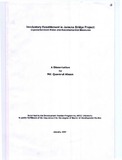| dc.contributor.advisor | Chowdhury, Abdul-Muyeed | |
| dc.contributor.author | Ahsan, Md. Quamrul | |
| dc.date.accessioned | 2010-09-26T09:18:09Z | |
| dc.date.available | 2010-09-26T09:18:09Z | |
| dc.date.copyright | 2007 | |
| dc.date.issued | 2007-01 | |
| dc.identifier.other | ID 05162005 | |
| dc.identifier.uri | http://hdl.handle.net/10361/236 | |
| dc.description | This dissertation is submitted in partial fulfillment of the requirements for the degree of Master of Development Studies, 2007. | en_US |
| dc.description | Cataloged from PDF version of dissertation. | |
| dc.description | Includes bibliographical references (page 81- 82). | |
| dc.description.abstract | Development projects often entail displacement of population. Every year millions of people in the world are involuntarily displaced due to infrastructure building programs. The affected population is seldom properly rehabilitated and is sacrificed for rather than benefited from development. The severe economic, social, cultural and environmental problems faced by the people often lead them to impoverishment. During any involuntary displacement, there exist eight general sub-processes that converge in impoverishment. Proper knowledge about these impoverishment processes can influence resettlement planning and implementation and they can also be purposively used to counteract the adverse effects.
About 4000 acres of land have been acquired for the construction of the Jamuna Bridge. The Project has displaced people living at the vicinity of the bridge site and affected the income and livelihood of about one lac people. The project authority (Jamuna Multipurpose Bridge Authority, JMBA) adopted a Resettlement Action Plan for proper resettlement of the Project Affected Persons (PAPs). The main objective of the resettlement plan was at least to restore the standards of living and income earning capacity of the PAPs, if not improved after resettlement.
This dissertation attempts to explore the impact and effects of resettlement on the economic life and livelihood of the project affected people. Firstly, it analyzes the impoverishment processes as risks and entitlement packages of the resettlement plan as counter risk measures in the context of Jamuna Bridge Project. Secondly, it examines whether the Project Affected Persons (PAPs) have restored their pre-project standard of living or not. It also attempts to shed some light on the reasons for non-restoration of former standard of living.
It is evident from the study that despite the adoption of a generous Resettlement Action Plan the Project Affected Persons of the Jamuna Multipurpose Bridge Project have not been able to reconstruct & restore completely their pre-project living standards in the post-project stage. The major failure was the inability of the affected population to regain or recoup the amount of land lost due to acquisition. Despite this deprivation the resettlement program attained considerable success in other dimensions. There has been a marked increase in the average annual income of the indirectly affected households. The directly affected households have been able to virtually restore the status of pre-project income. The quality of housing for the displaced people has also improved. Programs like providing squatters and uthulies with a piece of homestead land and providing project affected persons with access to health services, drinking water and sanitation have been very successful. This dissertation, finally, discusses some strategies that may be adopted by the implementing agency in future projects entailing displacement and resettlement. | en_US |
| dc.description.statementofresponsibility | Md. Quamrul Ahsan | |
| dc.format.extent | 82 pages | |
| dc.language.iso | en | en_US |
| dc.publisher | BRAC University | en_US |
| dc.rights | BRAC University dissertation are protected by copyright. They may be viewed from this source for any purpose, but reproduction or distribution in any format is prohibited without written permission. | |
| dc.subject | Developmental studies programs. | |
| dc.title | Involuntary resettlement in Jamuna bridge project: impoverishment risks and reconstruction measures | en_US |
| dc.type | Dissertation | en_US |
| dc.contributor.department | BRAC Development Institute, BRAC University | |
| dc.description.degree | M. Development Studies | |

